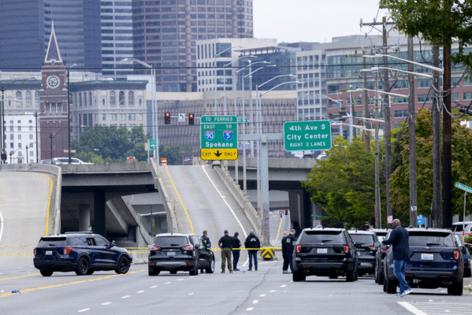Seattle crime survey reveals a decade of shifting safety concerns
Published in News & Features
SEATTLE — Seattle has a unique resource for understanding the public's concerns and perceptions about crime, safety and policing.
Over the past decade, Seattle University’s annual Seattle Public Safety Survey has offered an unusually detailed view of how residents perceive safety and policing in their neighborhoods.
Ten years' worth of surveys tell a story of shifting concerns about crime and safety in Seattle, one that reflects both local dynamics and national movements.
Perhaps the most striking trend in the survey data revolves around its questions on the public's trust and confidence in the police. These questions are synthesized into a police legitimacy" rating on a scale from 0 to 100.
In the first four surveys, from 2015 to 2018, the police legitimacy score was in the 60s. It dipped slightly below 60 in 2019 and 2020. Then, after 2020, it “took a nosedive,” said Seattle University's Jacqueline Helfgott, plunging into the 30s. Helfgott has led the project since its inception.
The drop coincided with national protests over policing after the murder of George Floyd and local turmoil around Seattle’s own protests and police-staffing exodus.
"Seattle is a very liberal city," Helfgott said. "People took those issues to heart, often without knowing how much reform had already taken place in the department."
Last year, the rating crept up slightly to the low 40s citywide, largely due to rebounds in the police legitimacy score in the Southwest and North precincts. The East Precinct remains the lowest. The Southwest Precinct covers West Seattle, the North Precinct covers North Seattle, and the East Precinct includes Capitol Hill, the Central District and other neighborhoods in the eastern half of Central Seattle.
Still, the citywide score for police legitimacy remains far below its pre-2020 levels.
Helfgott believes that for years, no other U.S. city has had anything like this survey, although Denver recently initiated a public safety survey based on Seattle's.
That survey produced legitimacy ratings in the 60s, where Seattle’s once were.
Interestingly, Helfgott found that when faith in police fell, neighbor-to-neighbor ties strengthened.
"As police legitimacy went down, social cohesion and informal social control went up," she said. In other words, people were more likely to talk with neighbors about safety concerns and get involved in things like block watches, community councils and simply being more alert.
"It’s as if when people don’t trust police, they rely more on each other," she said. “Then, when trust in police goes up, that community involvement goes down.” She hopes moving forward, Seattle residents can sustain both a renewed trust in police and continued investment in neighborhood relationships.
Each year, the survey identifies Seattle residents' top five public-safety concerns. When the survey began, the top concerns centered squarely on property crime, particularly car prowls and residential burglaries, and lack of police capacity.
Since 2023, however, something new has topped the list: traffic safety. “That was surprising,” Helfgott said. “Historically, only West Seattle mentioned it a lot. But now it’s citywide.”
Residents across precincts are voicing frustration about reckless driving, drag racing, unsafe crossings and conflicts between cars, bikes, scooters and pedestrians. In the survey’s qualitative comments, Helfgott notes, people describe tense encounters among cyclists, walkers and drivers and frequent complaints about construction zones and speeding.
Helfgott suspects the issue’s rise reflects both real hazards and changes in enforcement. “People don’t think police will stop them for speeding anymore,” she said, adding that reduced traffic enforcement after 2020, coupled with denser development and new mobility devices like scooters, has made streets feel more chaotic.
She also notes that traffic safety ranking as the top concern reflects the fact that Seattle is relatively safe and doesn't have the level of violent crime found in some other big cities.
Some long-running concerns have persisted. Homelessness, which first emerged as a major issue in survey results around 2018, remains among the top five themes, especially in the North Precinct and specifically the Ballard neighborhood. Meanwhile, gun violence and youth crime have recently climbed the rankings as well, but were not in the top five.
Participation in the survey itself has been robust but inconsistent. Annual responses have ranged from about 5,000 to over 11,000 citywide, with the North Precinct consistently providing the most feedback and the South Precinct the least. The data are weighted by age, race and sex to accurately reflect the city's demographics.
For Helfgott, the survey’s lasting value lies in its ability to empower both policymakers and residents. “This isn’t just for police,” she emphasized. Anyone can look at their neighborhood’s data and ask, how can we strengthen trust, or how can we build community?”
After 10 years, the survey reveals more than changing concerns — it traces how Seattle’s sense of safety, community, and responsibility continues to evolve.
The Seattle Public Safety Survey is open to all community members. Those who live and/or work in Seattle are encouraged to participate. The 2025 survey is underway and is available online through Nov. 30.
©2025 The Seattle Times. Visit seattletimes.com. Distributed by Tribune Content Agency, LLC.







Comments